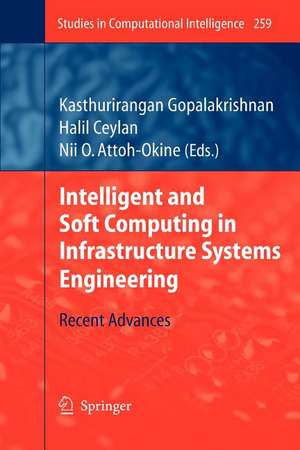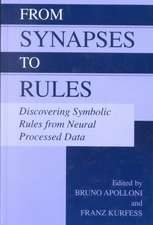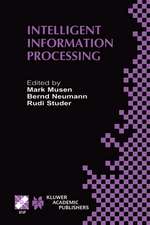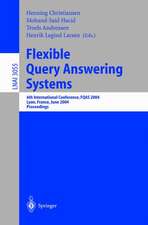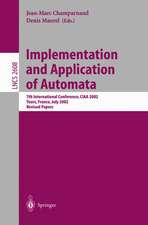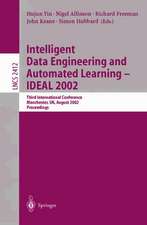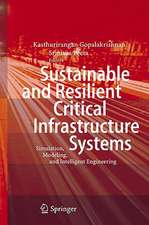Intelligent and Soft Computing in Infrastructure Systems Engineering: Recent Advances: Studies in Computational Intelligence, cartea 259
Editat de Kasthurirangan Gopalakrishnan, Halil Ceylan, Nii O. Attoh-Okineen Limba Engleză Paperback – 14 mar 2012
| Toate formatele și edițiile | Preț | Express |
|---|---|---|
| Paperback (1) | 988.98 lei 6-8 săpt. | |
| Springer Berlin, Heidelberg – 14 mar 2012 | 988.98 lei 6-8 săpt. | |
| Hardback (1) | 997.06 lei 6-8 săpt. | |
| Springer Berlin, Heidelberg – 19 noi 2009 | 997.06 lei 6-8 săpt. |
Din seria Studies in Computational Intelligence
- 20%
 Preț: 449.37 lei
Preț: 449.37 lei - 20%
 Preț: 1158.26 lei
Preț: 1158.26 lei - 20%
 Preț: 986.66 lei
Preț: 986.66 lei - 20%
 Preț: 1452.76 lei
Preț: 1452.76 lei - 20%
 Preț: 168.78 lei
Preț: 168.78 lei - 20%
 Preț: 1291.10 lei
Preț: 1291.10 lei - 18%
 Preț: 1112.30 lei
Preț: 1112.30 lei - 20%
 Preț: 565.39 lei
Preț: 565.39 lei - 20%
 Preț: 649.28 lei
Preț: 649.28 lei - 20%
 Preț: 1047.73 lei
Preț: 1047.73 lei - 20%
 Preț: 1578.96 lei
Preț: 1578.96 lei - 20%
 Preț: 643.50 lei
Preț: 643.50 lei - 20%
 Preț: 657.49 lei
Preț: 657.49 lei - 20%
 Preț: 993.28 lei
Preț: 993.28 lei - 20%
 Preț: 990.80 lei
Preț: 990.80 lei - 20%
 Preț: 989.96 lei
Preț: 989.96 lei - 20%
 Preț: 1165.69 lei
Preț: 1165.69 lei - 20%
 Preț: 1444.52 lei
Preț: 1444.52 lei - 20%
 Preț: 1041.96 lei
Preț: 1041.96 lei - 20%
 Preț: 1047.73 lei
Preț: 1047.73 lei - 20%
 Preț: 1046.06 lei
Preț: 1046.06 lei - 18%
 Preț: 2500.50 lei
Preț: 2500.50 lei - 20%
 Preț: 989.13 lei
Preț: 989.13 lei - 20%
 Preț: 1165.69 lei
Preț: 1165.69 lei - 20%
 Preț: 1164.05 lei
Preț: 1164.05 lei - 20%
 Preț: 1042.79 lei
Preț: 1042.79 lei - 20%
 Preț: 1460.19 lei
Preț: 1460.19 lei - 18%
 Preț: 1403.52 lei
Preț: 1403.52 lei - 18%
 Preț: 1124.92 lei
Preț: 1124.92 lei - 20%
 Preț: 1039.47 lei
Preț: 1039.47 lei - 20%
 Preț: 1008.11 lei
Preț: 1008.11 lei - 20%
 Preț: 1045.25 lei
Preț: 1045.25 lei - 20%
 Preț: 1275.42 lei
Preț: 1275.42 lei - 20%
 Preț: 1040.32 lei
Preț: 1040.32 lei - 20%
 Preț: 988.32 lei
Preț: 988.32 lei - 20%
 Preț: 1169.79 lei
Preț: 1169.79 lei - 20%
 Preț: 1162.37 lei
Preț: 1162.37 lei - 20%
 Preț: 1059.26 lei
Preț: 1059.26 lei - 20%
 Preț: 1164.05 lei
Preț: 1164.05 lei - 20%
 Preț: 1166.52 lei
Preț: 1166.52 lei - 20%
 Preț: 1459.38 lei
Preț: 1459.38 lei - 18%
 Preț: 1005.74 lei
Preț: 1005.74 lei - 20%
 Preț: 997.38 lei
Preț: 997.38 lei - 20%
 Preț: 1055.94 lei
Preț: 1055.94 lei - 20%
 Preț: 1284.47 lei
Preț: 1284.47 lei - 20%
 Preț: 994.08 lei
Preț: 994.08 lei - 20%
 Preț: 1048.72 lei
Preț: 1048.72 lei - 20%
 Preț: 1066.02 lei
Preț: 1066.02 lei - 20%
 Preț: 943.78 lei
Preț: 943.78 lei - 20%
 Preț: 1173.10 lei
Preț: 1173.10 lei
Preț: 988.98 lei
Preț vechi: 1236.23 lei
-20% Nou
Puncte Express: 1483
Preț estimativ în valută:
189.30€ • 205.69$ • 159.12£
189.30€ • 205.69$ • 159.12£
Carte tipărită la comandă
Livrare economică 21 aprilie-05 mai
Preluare comenzi: 021 569.72.76
Specificații
ISBN-13: 9783642261503
ISBN-10: 3642261507
Pagini: 336
Ilustrații: X, 325 p.
Dimensiuni: 155 x 235 x 18 mm
Greutate: 0.47 kg
Ediția:2010
Editura: Springer Berlin, Heidelberg
Colecția Springer
Seria Studies in Computational Intelligence
Locul publicării:Berlin, Heidelberg, Germany
ISBN-10: 3642261507
Pagini: 336
Ilustrații: X, 325 p.
Dimensiuni: 155 x 235 x 18 mm
Greutate: 0.47 kg
Ediția:2010
Editura: Springer Berlin, Heidelberg
Colecția Springer
Seria Studies in Computational Intelligence
Locul publicării:Berlin, Heidelberg, Germany
Public țintă
ResearchCuprins
Rapid Interpretation of Nondestructive Testing Results Using Neural Networks.- Probabilistic Inversion: A New Approach to Inversion Problems in Pavement and Geomechanical Engineering.- Neural Networks Application in Pavement Infrastructure Materials.- Backcalculation of Flexible Pavements Using Soft Computing.- Knowledge Discovery and Data Mining Using Artificial Intelligence to Unravel Porous Asphalt Concrete in the Netherlands.- Backcalculation of Pavement Layer Thickness and Moduli Using Adaptive Neuro-fuzzy Inference System.- Case Studies of Asphalt Pavement Analysis/Design with Application of the Genetic Algorithm.- Extended Kalman Filter and Its Application in Pavement Engineering.- Hybrid Stochastic Global Optimization Scheme for Rapid Pavement Backcalculation.- Regression and Artificial Neural Network Modeling of Resilient Modulus of Subgrade Soils for Pavement Design Applications.- Application of Soft Computing Techniques to Expansive Soil Characterization.
Textul de pe ultima copertă
The use of intelligent and soft computing techniques in the field of geomechanical and pavement engineering has steadily increased over the past decade owing to their ability to admit approximate reasoning, imprecision, uncertainty and partial truth. Since real-life infrastructure engineering decisions are made in ambiguous environments that require human expertise, the application of soft computing techniques has been an attractive option in pavement and geomechanical modeling. The objective of this carefully edited book is to highlight key recent advances made in the application of soft computing techniques in pavement and geomechanical systems. Soft computing techniques discussed in this book include, but are not limited to: neural networks, evolutionary computing, swarm intelligence, probabilistic modeling, kernel machines, knowledge discovery and data mining, neuro-fuzzy systems and hybrid approaches. Highlighted application areas include infrastructure materials modeling, pavement analysis and design, rapid interpretation of nondestructive testing results, porous asphalt concrete distress modeling, model parameter identification, pavement engineering inversion problems, subgrade soils characterization, and backcalculation of pavement layer thickness and moduli. Researchers and practitioners engaged in developing and applying soft computing and intelligent systems principles to solving real-world infrastructure engineering problems will find this book very useful. This book will also serve as an excellent state-of-the-art reference material for graduate and postgraduate students in transportation infrastructure engineering.
Caracteristici
State of the art of intelligent and soft computing in infrastructure systems engineering
